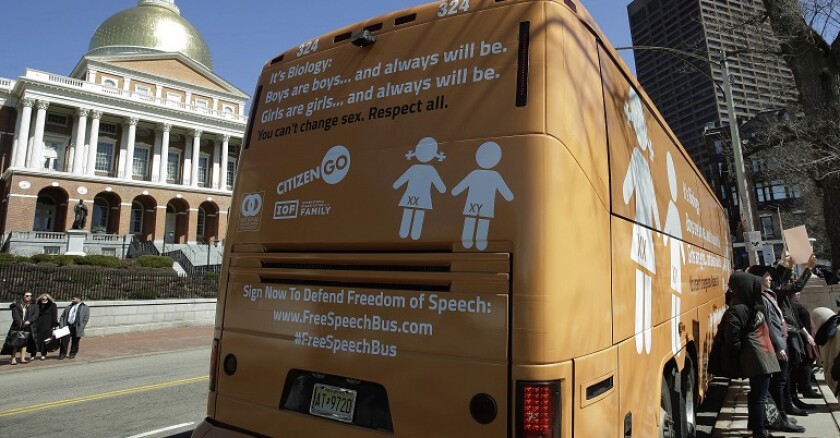In July 1998, 24-year-old Lucas Rosa walked into a Massachusetts bank to apply for a car loan. The loan officer refused to give Rosa an application and instructed her to leave and return wearing men’s clothing before she could apply.
Rosa is a transgender woman who later won a lawsuit against Park West Bank in 2000, marking a significant victory in the emerging fight against transgender discrimination. Since Rosa’s case, the state added discrimination protections for transgender people in public spaces, including restaurants, hospitals and bathrooms.
In danger of being overturned, those protections were upheld by Massachusetts voters on Tuesday in the country’s first statewide referendum on transgender rights. With 67 percent of the vote in favor of Massachusetts' Question 3, the state will keep in place the anti-discrimination law, which Republican Gov. Charlie Baker signed in 2016.
“No one should be discriminated against in Massachusetts because of their gender identity,” said Baker after signing the bill two years ago.
The vote marks a victory for the LGBTQ community.
"It would [have been] devastating for the transgender community to have these rights stripped away through a popular vote," said Janson Wu, executive director of GLBTQ Legal Advocates and Defenders (GLAD). "Especially for young transgender people who already have higher rates of depression and suicide because of society's stigma on who they are."
When it comes to LGBTQ rights, Massachusetts is hailed as a leader. In 1974, former state Rep. Elaine Noble became the nation's first openly gay candidate elected to a state legislature. In 2003, the state became the first to legalize same-sex marriage. In 2011, former Gov. Deval Patrick signed the state’s first round of transgender protections, which covered employment, housing, education, and credit and lending.
While the anti-discrimination law applies to any place that is “open to and accepts or solicits the patronage of the general public,” opponents of it focused on bathroom access because it is easier to stir up fear about women’s safety, said Deborah Shields, executive director of the advocacy group MassEquality. (Polls this summer showed that voters were much less likely to approve of the transgender protections when the question focused on bathrooms. When the question used broader language with no mention of bathrooms, support increased by 20 percent.)
The final ballot language did not mention bathrooms or transgender people specifically. Instead, it asked whether voters wanted to keep the current law, "which prohibits discrimination on the basis of gender identity in places of public accommodation."
For opponents of Massachusetts’ transgender protections, the issue of bathrooms and public safety is significant.
Yvette Ollada is a spokesperson for Keep MA Safe, the group that petitioned to get the measure on the ballot. Her group makes a common argument: that sex offenders could pretend to be transgender and commit sexual crimes in bathrooms and locker rooms.
It's an argument that has continually proven to be untrue.
A study published this month from the Williams Institute at UCLA School of Law concludes that anti-discrimination laws like Massachusetts’ are not related to the frequency of sexual offenses in these facilities. The researchers looked at Massachusetts specifically because, prior to 2016, some localities in the state had anti-discrimination policies for public accommodations and others did not, says Amira Hasenbush, one of the study’s authors. They made a public records request for crime data before and after the 2016 law and compared localities with similarities in crime rates and demographics to determine the effect.
“The point of our research," said Hasenbush, "is that it takes out some of the other background noise and only looks at the impact of that law because we’re looking both at a place with the policy and without the policy."
For results of the most important ballot measures, click here.









